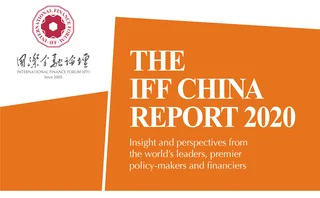
Open wide


Since its establishment, China’s capital market has not ceased its efforts to open up. In recent years, it has seen ever more accelerating movement and profound reform.
In February 1992, the first B‑shares – in Shanghai Vacuum Electronics – were publicly issued on the Shanghai Stock Exchange, marking the inauguration of the opening-up of China’s capital market. The Qualified Foreign Institutional Investor (QFII) programme was established and resulted in the emergence of H‑shares in Hong Kong. In December 2002, China further opened its capital market with the Provisional measures on administration of domestic securities investments of QFII, jointly issued by the China Securities Regulatory Commission (CSRC) and the People’s Bank of China. Under the QFII programme, foreign institutions were able to directly invest in China’s securities market within the quota permitted by the State Administration of Foreign Exchange (Safe).
In December 2011, the CSRC, Safe and the People’s Bank of China released the Measures for pilot domestic securities investment made by Renminbi Qualified Foreign Institutional Investors (RQFII) of fund management companies and securities companies. This allowed foreign institutional investors to carry out renminbi‑based investment in the domestic securities market within the permitted quota: a great stride forward, yet still an opening-up in only one direction.
With investors and the domestic market maturing, China accelerated the gradual opening-up of the capital market with more depth and width – this time in both directions. In November 2014, the Shanghai–Hong Kong Stock Connect programme was officially launched as a bridge between the two stock exchanges. This proved the first movement of the two-way opening up of China’s capital market and also laid the foundation for the operation of the Shenzhen–Hong Kong Stock Connect and Shanghai–London Stock Connect programmes, which were launched in December 2016 and August 2018.
After the establishment of QFII and RQFII mechanisms, the permitted quota amount grew rapidly. Restrictions on the investment quota of QFII and RQFII were abolished by Safe in September 2019, and restrictions on the pilot countries and regions of RQFII were also cancelled.
2019 – A year of accelerating opening-up
Since March 2019, A-shares have been included in the MSCI, FTSE Russell, Standard & Poor’s, Dow Jones and many other international indexes. At the same time, China continues to open its renminbi-denominated bond market and move even faster. Remarkable outcomes have been achieved throughout 2019.
In January, Standard & Poor’s was admitted into the Chinese credit rating market and, in April, several Chinese bonds joined the Bloomberg Barclays Indices. To further facilitate foreign institutional investment in the domestic interbank bond market, the People’s Bank of China and Safe jointly announced new rules in October that allowed the non-transacting transfer of bonds under the same overseas entity (QFII/RQFII), direct entry channels and transfer between capital accounts. The rules also stated that the same overseas entity entering the market through these channels only needed to file a single record once. Thanks to these preferential rules, overseas institutions are flooding into the Chinese bond market. In November, there were 2,517 institutions in the domestic interbank bond market – double the number at the end of 2018.
Li Chao, vice-chairman of the CSRC, commented at the 2019 annual meeting of the International Finance Forum (IFF) that, in recent years, overseas capital has continued to move into China’s stock and bond markets, including over CNY240 billion into the stock market alone, reflecting the confidence in China’s reform of the capital market and the sound long-term development of China’s economy. China has significantly relaxed foreign equity restrictions, allowed overseas institutions to open fully funded enterprises and has moved forward to mutual recognition of financial products and tools. All of these efforts serve as evidence that China has entered a new phase of opening-up.
A key milestone in the development of China’s capital market occurred in June 2019, when the Science and Technology Innovation Board (Star Market) was officially launched. The next step for the Chinese government will be to further facilitate Shanghai’s genesis as an international financial centre, with emphasis on supporting Shanghai to phase out foreign ownership limits in securities and fund management companies, thus expanding the business scope of foreign financial institutions. No matter how circumstances change, the CSRC is committed to building a business-enabling environment based on market principles, governed by law and adhering to international standards, and will firmly promote the opening-up of the capital market. In June, an agreement for a Sino–Japan ETF [exchange-traded fund] Connect programme was signed, opening the door for Chinese investors to the Japanese ETF market. In July, the Financial Stability and Development Committee under the State Council of the People’s Republic of China revealed 11 measures to open the financial sector, including the lifting of restrictions on foreign ownership of securities, fund management and futures companies by 2020.
A profound impact
Without the development of the capital market and its ability to channel finance, the economy and its enterprises will lack sufficient foundation to thrive, resulting in a shortage of new job opportunities. The capital market is able not only to fulfil the financial demands of government, enterprises and other participants, but also to create investment opportunities for capital suppliers. A globalised capital market is also critical for cross-border enterprise financing, fund investment and asset management.
Zhou Xiaochuan, IFF chairman of the general assembly and vice-chairman of the 12th Chinese People’s Political Consultative Conference, said at the IFF 2019 Annual Meeting that a strong capital market is necessary to distribute savings, improve efficiency and prevent the market from becoming divided.
Also in attendance was Sultan Bin Nasser Al Suwaidi, IFF vice-chairman and former governor of the Central Bank of the United Arab Emirates, who said that the opening-up of the capital market was essential, without which economies would not prosper, especially small and medium-sized businesses.
Martin Scheck, IFF board member and chief executive of the International Capital Market Association, pointed out that the opening-up of an emerging economy’s capital market can make the economy itself more open, increasing fund sources, easing the burden on the banking system and enabling the fund to move in a freer, more convenient manner.
Chen Chunyan, secretary-general of the Asset Management Association of China, noted that the opening-up of China’s capital market should include more efforts to bring in overseas financial resources, and that the domestic market, with a mere 30 years’ development, should learn from overseas counterparts about risk management, investment strategies, analysis of the market and investor education, among other areas.
Zhan Yuyin, chairman of E Fund Management, which issued one of the first four China–Japan ETF funds, said opening-up is a process of mind emancipation that would affect market participants’ behaviour in investment, management, supervision and operation. This is key to transforming mechanisms and establishing a vibrant and resilient capital market. Because of differences in the development stage, legal system and basis of financial infrastructure, the opening-up of the capital market – especially in emerging economies – may inevitably encounter some barriers.
Sultan Bin Nasser Al Suwaidi added that the globalisation of capital markets makes markets more interdependent, and risks may also cause contagion.
Zhu Ning, IFF co-secretary-general, said that, first, in the process of opening-up, overseas investors are better at predicting capital market trends and making decisions than domestic investors. Second, evidence clearly shows that institutional investors have stronger investment capabilities than individuals and, third, experience has proved that individual investors have many flaws in their investment behaviours.
Only users who have a paid subscription or are part of a corporate subscription are able to print or copy content.
To access these options, along with all other subscription benefits, please contact info@centralbanking.com or view our subscription options here: www.centralbanking.com/subscriptions
You are currently unable to print this content. Please contact info@centralbanking.com to find out more.
You are currently unable to copy this content. Please contact info@centralbanking.com to find out more.
Copyright Infopro Digital Limited. All rights reserved.
As outlined in our terms and conditions, https://www.infopro-digital.com/terms-and-conditions/subscriptions/ (point 2.4), printing is limited to a single copy.
If you would like to purchase additional rights please email info@centralbanking.com
Copyright Infopro Digital Limited. All rights reserved.
You may share this content using our article tools. As outlined in our terms and conditions, https://www.infopro-digital.com/terms-and-conditions/subscriptions/ (clause 2.4), an Authorised User may only make one copy of the materials for their own personal use. You must also comply with the restrictions in clause 2.5.
If you would like to purchase additional rights please email info@centralbanking.com







